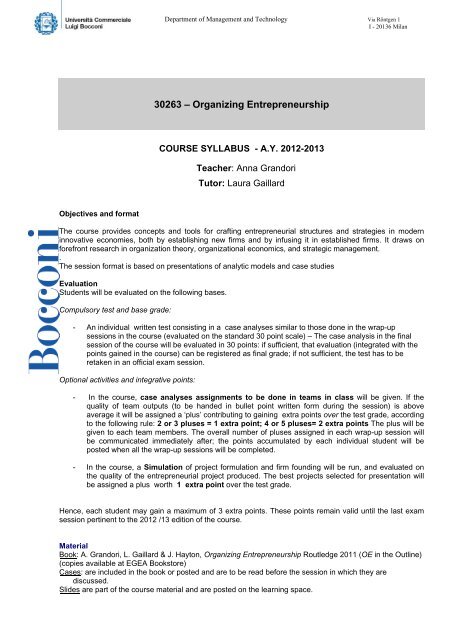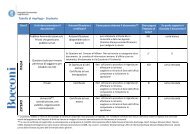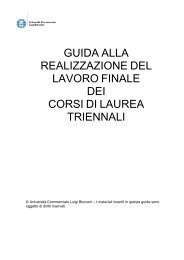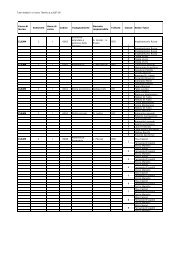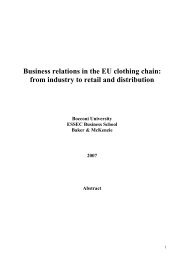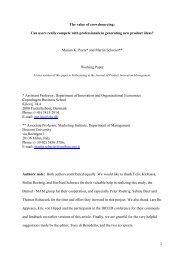30263 – Organizing Entrepreneurship
30263 – Organizing Entrepreneurship
30263 – Organizing Entrepreneurship
Create successful ePaper yourself
Turn your PDF publications into a flip-book with our unique Google optimized e-Paper software.
Objectives and format<br />
Department of Management and Technology Via Röntgen 1<br />
I - 20136 Milan<br />
<strong>30263</strong> – <strong>Organizing</strong> <strong>Entrepreneurship</strong><br />
COURSE SYLLABUS - A.Y. 2012-2013<br />
Teacher: Anna Grandori<br />
Tutor: Laura Gaillard<br />
The course provides concepts and tools for crafting entrepreneurial structures and strategies in modern<br />
innovative economies, both by establishing new firms and by infusing it in established firms. It draws on<br />
forefront research in organization theory, organizational economics, and strategic management.<br />
.<br />
The session format is based on presentations of analytic models and case studies<br />
Evaluation<br />
Students will be evaluated on the following bases.<br />
Compulsory test and base grade:<br />
- An individual written test consisting in a case analyses similar to those done in the wrap-up<br />
sessions in the course (evaluated on the standard 30 point scale) – The case analysis in the final<br />
session of the course will be evaluated in 30 points: if sufficient, that evaluation (integrated with the<br />
points gained in the course) can be registered as final grade; if not sufficient, the test has to be<br />
retaken in an official exam session.<br />
Optional activities and integrative points:<br />
- In the course, case analyses assignments to be done in teams in class will be given. If the<br />
quality of team outputs (to be handed in bullet point written form during the session) is above<br />
average it will be assigned a ‘plus’ contributing to gaining extra points over the test grade, according<br />
to the following rule: 2 or 3 pluses = 1 extra point; 4 or 5 pluses= 2 extra points The plus will be<br />
given to each team members. The overall number of pluses assigned in each wrap-up session will<br />
be communicated immediately after; the points accumulated by each individual student will be<br />
posted when all the wrap-up sessions will be completed.<br />
- In the course, a Simulation of project formulation and firm founding will be run, and evaluated on<br />
the quality of the entrepreneurial project produced. The best projects selected for presentation will<br />
be assigned a plus worth 1 extra point over the test grade.<br />
Hence, each student may gain a maximum of 3 extra points. These points remain valid until the last exam<br />
session pertinent to the 2012 /13 edition of the course.<br />
Material<br />
Book: A. Grandori, L. Gaillard & J. Hayton, <strong>Organizing</strong> <strong>Entrepreneurship</strong> Routledge 2011 (OE in the Outline)<br />
(copies available at EGEA Bookstore)<br />
Cases: are included in the book or posted and are to be read before the session in which they are<br />
discussed.<br />
Slides are part of the course material and are posted on the learning space.
Course Outline<br />
Schedule: Wednesdays h.18.00-19.30; Fridays h.13.00-14.30, Room N33 (plus additional sessions as indicated)<br />
Session Topic Readings<br />
Session 1<br />
12-9<br />
Session 2&3<br />
14-9<br />
(h.12.00-<br />
13.30&14.30-<br />
16.00)<br />
Session 4<br />
19-9<br />
Session 5<br />
21-9<br />
Session 6<br />
26-9<br />
Session 7<br />
28-9<br />
Session 8<br />
3-10<br />
Discovering<br />
opportunities in the<br />
economy<br />
Ent’l decision<br />
making<br />
Creating<br />
opportunities<br />
through social<br />
networks<br />
WRAP UP ON<br />
OPPORTUNITIES<br />
Human and social<br />
capital: the<br />
formation of<br />
entrepreneurial<br />
teams<br />
Networked<br />
technology<br />
Structural sources of<br />
opportunities OE 1.1<br />
Cognitive sources of<br />
opportunities OE 1.3<br />
Relational sources of<br />
opportunities OE 1.2<br />
Cases (Box n.)<br />
Jack Brash (1.1)<br />
‘Cases in economic discovery’ (1.4)<br />
Opportunity framing (Guest)<br />
“Cases in economic brokerage” (1.3)<br />
Junior Enterprises (JEME) (1.2)<br />
End CH 1 Case: The Body Shop (Teamwork on case, Pluses<br />
assigned)<br />
‘Networked human<br />
resources’ OE 2.1, 2.2<br />
‘Networked access to<br />
technology’ OE 2.3<br />
Networked finance ‘Networked finance’<br />
OE 2.4<br />
Session 9 WRAP-UP ON<br />
5-10 RESOURCES<br />
No class on Wednesday<br />
10-10<br />
Session 10 ENT LAB<br />
12-10 SIMULATION (I)<br />
Session 11<br />
16-10 h.13.00<br />
Session 12<br />
17-10<br />
Session 13<br />
7-11<br />
Session 14<br />
9-11<br />
Session 15<br />
14-11<br />
ENT LAB<br />
SIMULATION (II)<br />
ENT LAB<br />
SIMULATION<br />
(III)<br />
Governance and<br />
ownership structure<br />
Organization<br />
structure and HR<br />
systems<br />
WRAP-UP CASE<br />
ON ENT - FIRM<br />
ORGANIZATION<br />
Case: The Virgin team ( Box 2.3),<br />
Grameen Bank (2.2).<br />
Cases: Itaca Nova (2.1) & Nano Active<br />
Film (2.4), LEGO (posted)<br />
Cases: The waterproof player (2.7),<br />
VC/Ent negotiations (2.9)<br />
End Ch 2 Case: RIM & the BlackBerry (Teamwork on case, Pluses<br />
assigned)<br />
‘Governance,<br />
ownership and legal<br />
forms’ OE 3.1<br />
‘The internal<br />
organizational of ent<br />
firms’ OE 3.2<br />
Team formation and identification of<br />
opportunities - Formulation of Business<br />
Plans<br />
- Presentation of Selected Projects and<br />
Formation of Ent/VC-BA Negotiation<br />
Tables<br />
- Conclusion and discussion of Ent/VC-<br />
BA agreements<br />
Case: EGON ZEHNDER (3.3)<br />
Cases: EZ (3.3), AX. I (3.2) (Hagakure,<br />
Argan Oil Coops = Posted)<br />
TESTIMONIAL: Marco Brini, Founder&CEO, Minteos-
Session 16<br />
16-11<br />
Session 17<br />
20-11 h.13.00<br />
Session 18<br />
21-11<br />
Session 19<br />
23-11<br />
Session 20<br />
28-11<br />
Session 21<br />
30-11<br />
Session 22<br />
5-12<br />
Session 23<br />
11 -12 h.13<br />
Session 24<br />
12-12<br />
WRAP-UP CASE<br />
ON ENT - FIRM<br />
ORGANIZATION<br />
Internal and<br />
networked growth.<br />
Forms of alliances<br />
Managing alliances<br />
and networked<br />
growth<br />
<strong>Organizing</strong><br />
environments for<br />
entreprenurship<br />
WRAP-UP ON<br />
FIRM<br />
BOUNDARIES &<br />
NETWORKS<br />
Corporate<br />
<strong>Entrepreneurship</strong><br />
Entrepreneurial<br />
careers and Serial<br />
entrepreneurship<br />
GENERAL WRAP-<br />
UP<br />
Suggested Further Readings:<br />
Enveve<br />
Case: MINTEOS (End Ch 3 Case + Box 4.2 Minteos II +Brini<br />
Testimonial intervention) (Teamwork on case, Pluses assigned)<br />
‘Networked growth’<br />
OE 4.2,<br />
‘Networked growth’<br />
OE 4.2<br />
Best Western (4.9) vs The ATR<br />
Consortium ( posted)<br />
Body Shop.II (4.6) vs Int’l Delivery (4.7)<br />
OE OE 6.1, 6.2, 6.3 Cases: Silicon Valley (Box 6.5&6.6) vs<br />
Sophia Antipolis (Box 6.13)<br />
Case : VERSACE (Box 4.4 - Teamwork on case, Pluses assigned)<br />
<strong>Organizing</strong> for<br />
innovation in<br />
established firms<br />
(OE 5.1)<br />
Cases TCG, Acer, Oticon, Semco<br />
(Distributed)<br />
TESTIMONIAL: Gianni Dell’Orto, Co-Founder Promatem,<br />
Founder&CEO Viva3esse<br />
Case Promatem (End Ch 4)+ Dell’Orto<br />
Testimonial intervention<br />
Evaluated final case analysis (Distributed)<br />
� Alvarez S.A., Barney J.B. 2007 (eds) ‘The entrepreneurial theory of the firm’ Journal of Management<br />
Studies. 44/ 7 Special Issue.<br />
� Andretsch D.B., Litan R. (eds) <strong>Entrepreneurship</strong> and Openness. Edward Elgar. 2009<br />
� Baden-Fuller, C.W. and J. Stopford [1994]. ‘Creating Corporate <strong>Entrepreneurship</strong>’. Strategic Management<br />
Journal, vol. 15, 521-536.<br />
� Baron J.N., Kreps D.M. 1999 ‘HRM in emerging companies’ In J.N. Baron and D.M. Kreps, Strategic Human<br />
Resources. New York, Wiley.<br />
� Baron R.A., Shane S.A. <strong>Entrepreneurship</strong>. A process perspective. Thomson South-Western, 2005<br />
� Casson M. The entrepreneur. An Economic Theory. Edward Elgar, 2003<br />
� Clarysse B., Roure J., Schamp T. <strong>Entrepreneurship</strong> and the financial community. Edward Elgar. 2007<br />
� Davidsson P, Delmar F., Wiklund J. <strong>Entrepreneurship</strong> and the growth of firms. Edward Elgar 2006<br />
� Foss N., Klein P. <strong>Organizing</strong> Entrepreneurial Judgment. Oxford University Press 2012.<br />
� Graf H. Networks in the innovation process. Edward Elgar. 2006<br />
� Gustaffsson V. Entrepreneurial decision making. Edward Elgar 2006.<br />
� Harryson J. The know-who Based <strong>Entrepreneurship</strong>. From Knowledge Creation to Business Implementation.<br />
Edward Elgar 2006<br />
� Hitt, M.A., Ireland, R.D., Camp S. M., Sexton, D.L. (Eds) Strategic entrepreneurship, Creating a new<br />
mindset. Blackwell Publishing 2002<br />
� Jones G. , Wadhwani (eds) <strong>Entrepreneurship</strong> and global capitalism. Edward Elgar 2008<br />
� Link A.N. <strong>Entrepreneurship</strong> and technology policy . Edward Elgar. 2006<br />
� Miles R. et al 1997 1997 ‘<strong>Organizing</strong> in the knowledge age: Anticipating the cellular form’ Academy of<br />
Management Executive 11/4:7-21.<br />
� Oviatt B.M., McDougall P.P.(eds) International <strong>Entrepreneurship</strong>. Edward Elgar. 2007<br />
� Rajan R.G., Zingales L. ‘The governance of the new enterprise’. In X. Vives (ed.), Corporate Governance,<br />
Cambridge University Press, 2000,<br />
� Siegel D.S. Technological <strong>Entrepreneurship</strong>. Edward Elgar 2006<br />
� Singh J., Robert P. Entrepreneurial Opportunity Recognition through social networks, London:Routledge<br />
2000
About the teachers<br />
ANNA GRANDORI is Professor of Business Organization, and President of the Center of Research on<br />
Organization and Management at Bocconi. She has been visiting professor in various universities in Europe<br />
and the US (e.g. NYU, Stanford, Chicago, Copenhagen BS, Zurich, Tilburg); Scientific Director of various<br />
international research programs, and Editor of academic international journals in Organization and<br />
Management. Her research - integrating organizational economics and organization theory in an innovation<br />
and design perspective and addressing themes as innovative decision making, knowledge governance, and<br />
organizational networks - and has been published by major international academic journals and book<br />
publishers (e.g. ‘Inter-firm networks: organization and industrial competitiveness’ (ed) Routledge 1998;<br />
'Organization and economic behavior', Routledge, 2001; ‘Corporate Governance and Firm Organization’<br />
Oxford University Press 2004; ‘<strong>Organizing</strong> <strong>Entrepreneurship</strong>’- with L. Gaillard- Routledge, 2011; ‘The<br />
Handbook of Economic Organization’ (ed) Edward Elgar 2013).<br />
LAURA GAILLARD is Professeur Habilitée of <strong>Entrepreneurship</strong> in France as well as an active<br />
entrepreneur and consultant in the field - especially on entrepreneurial motivation and commitment,<br />
women entrepreneurship and international entrepreneurship. She is a member of the Académie de<br />
l’Entrepreneuriat and of the scientific committee of ECER (European Cities <strong>Entrepreneurship</strong><br />
Ranking).<br />
Office hours<br />
Office hours are available at (Quick Reference for > Current Students > Timetables, Calendars and<br />
Rooms > Faculty office hours). Office hours could vary: please check on the website.<br />
Segreteria Dipartimento di Management – IOSI<br />
Mrs. Iolanda De Monte<br />
Via Röntgen, 1 – 4 th Floor – Room C3-02 - Ph. 02.5836.2632-2533<br />
Mail : iolanda.demonte@unibocconi.it<br />
HONOR CODE<br />
Università Bocconi conceives of education as an ongoing process that stretches across a person’s entire professional<br />
life. The University hopes that the entire Bocconi community will respect the values of fairness and correctness<br />
associated with it, values which inspire and guide the conduct of all community members as they pursue common<br />
objectives and a shared mission. The Università Bocconi Honor Code is published at<br />
http://www.unibocconi.eu/honorcode. We encourage all students to read it.


